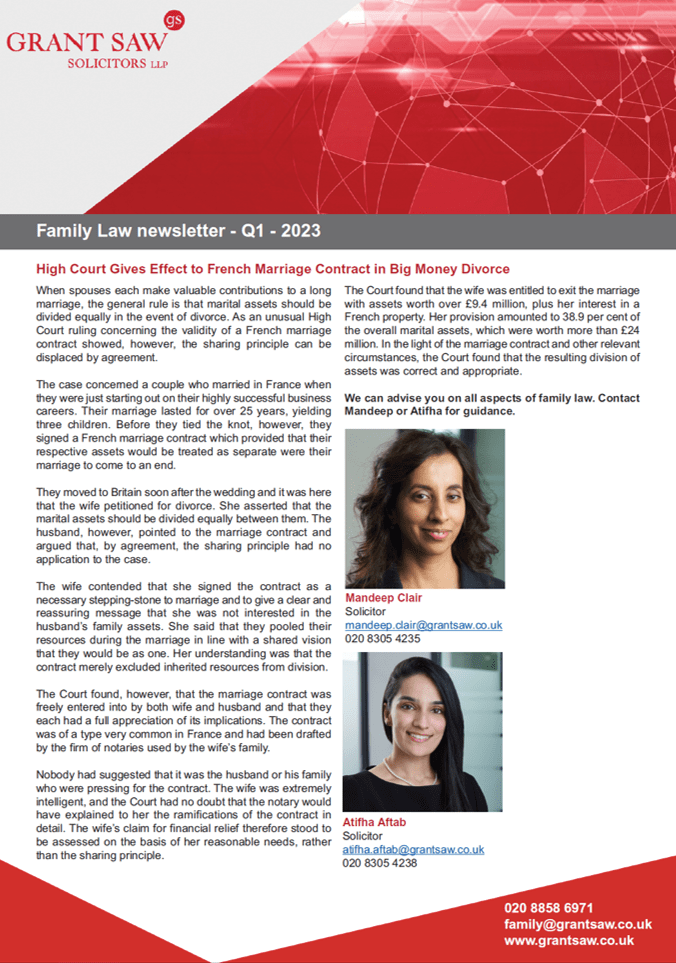CLOSED - DO NOT DELETE
Age
Have you been discriminated against at work on the grounds of your age? It is unlawful for an employer to discriminate against you because of your age. There are detailed requirements on retirement. We explain the law.
Discrimination at work on the grounds of your age is against the law and yet surveys show that many people still feel that they are treated unfairly at work because of their age.
There are different types of age discrimination, namely direct discrimination, indirect discrimination, harassment and victimisation. Direct age discrimination is some detrimental action against you because of your age, whatever it is. Indirect age discrimination arises because of some requirement of your employment that puts you at a disadvantage because of your age – for example, that a particular job requires a high degree of fitness, which generally favours younger people, or a certain amount of experience, which generally favours older people. The law recognises that there will be cases where such requirements are justified – but it requires a high standard of proof.
Harassment is unwanted conduct which has the purpose or effect of violating your dignity or creating an intimidating, hostile, degrading, humiliating or offensive environment for you at work. This would include ageist jokes or remarks. Victimisation is some detrimental action against you because you have brought proceedings or asserted your employment rights under the age discrimination legislation.
The law covers discrimination in all aspects of employment including recruitment, the terms of the employment contract, promotion and training, discipline and dismissal. Common issues include:
- benefits and holiday depending on length of service
- health insurance for employees who are over retirement age
- length of service taken into account for redundancy selection
- requirements for certain experience or qualifications
- education and training
Retirement
The compulsory retirement of company employees at the age of 65 is no longer permitted. If an employee is forced to retire, they will have a claim for unfair dismissal and age discrimination unless the employer has established a new retirement age for the organisation which is above the age of 65 and which is objectively justified. Objective justification of any compulsory retirement age is likely to be very difficult.
Age Discrimination Claims
Claims of age discrimination in employment are brought in the employment tribunal. Employees and certain other workers are protected by the law. Anything done by an employee in the course of their employment is treated as done by the employer. So, discrimination by a colleague, even without your employer’s knowledge or approval, may give you a right to bring a claim.
Because discrimination can be hard to prove, there are rules of evidence which can assist employees in bringing a claim to the employment tribunal. However there are strict time limits to bring a discrimination claim, usually within 3 months of the alleged act of discrimination. If you do not bring your claim in time you may lose your right to do so. If you bring an age discrimination claim and it is successful, you may be awarded compensation for loss of earnings and employment benefits and for injury to feelings.
Our solicitors can advise you on all aspects of discrimination policy and procedure.
Disability
Have you suffered discrimination at work because you are disabled? It is unlawful for an employer to discriminate against you because you have a disability. Our solicitors can explain your employment rights and the legal consequences if they are not met.
The law says that you are disabled if you have ‘a physical or mental impairment which has a substantial and long-term adverse effect on your ability to carry out normal day-to-day activities’. Normal day-to-day activities are everyday things such as eating, washing, walking and travelling around and they are not limited to the things you do at work. A normal day-to-day activity must affect one of the ‘capacities’ listed in the Disability Discrimination Act which include mobility, manual dexterity, speech, hearing, sight and memory.
You must not be discriminated against because you are disabled or for a reason related to your disability. The law recognises that there will be cases where certain requirements that place disabled persons at a disadvantage are justified – but it may require adjustments to be made to your working arrangements and place of work.
Harassment is unwanted conduct which has the purpose or effect of violating your dignity or creating an intimidating, hostile, degrading, humiliating or offensive environment for you at work. This may include jokes or remarks about disabled people. Victimisation is some detrimental action against you because you have brought proceedings or asserted your employment rights under the disability discrimination legislation.
The law covers disability discrimination in all aspects of employment including recruitment, the terms of the employment contract, promotion and training, discipline and dismissal. Common issues include:
- interview and recruitment arrangements
- adjustments to working arrangements
- time off for medical treatment
- periods of absence and sick pay
Right to adjustments
If you are disabled, your employer has a duty to make reasonable adjustments to your working arrangements to overcome the disadvantages caused by your disability. Whether it is appropriate to make a particular adjustment will depend on the likelihood that it will be effective and on a number of other considerations, including the cost. Some examples of reasonable adjustments are:
- allocating some of your duties to another person
- transferring you to another job or another place of work
- making adjustments to the place where you work
- changing your hours of work
- providing training
- providing special equipment.
Claims of disability discrimination in employment are brought in the employment tribunal. Employees and certain other workers are protected by the law. Anything done by an employee in the course of their employment is treated as done by the employer. So, discrimination by a colleague, even without your employer’s knowledge or approval, may give you a right to bring a claim.
Because discrimination can be hard to prove, there are rules of evidence which can assist employees in bringing a claim to the employment tribunal. However there are strict time limits to bring a discrimination claim, usually within 3 months of the alleged act of discrimination. If you do not bring your claim in time you may lose your right to do so. If you bring a disability discrimination claim and it is successful, you may be awarded compensation for loss of earnings and employment benefits and for injury to feelings.
Our solicitors can advise you on all aspects of discrimination policy and procedure.
Equal Pay
Are you concerned about an issue of equal pay? The law relating to equal pay is complex. Our solicitors can explain your employment rights and the legal consequences if they are not met.
Since the 1970s, women have been able to claim equal pay with men. Pay in this context includes contractual benefits, including bonuses and pension contributions, as well as basic wages or salary. The right to equal pay applies to men as well as to women.
The Equal Pay Act does not straightforwardly prohibit discrimination in pay. Instead it adopts a rather artificial approach. It applies an equality clause into the woman’s contract of employment to change it where she does any of the following:
- like work to a man
- work rated as equivalent to work done by a man
- work of equal value to that done by a man.
The change make woman’s terms the same as the man doing this work, unless the employer can show that the difference between the woman’s contract of employment and the man’s is genuinely due to a material factor which is not the difference of sex. Examples of these material factors include:
- length of service
- skill shortages
- geographical differences
- different skills, qualifications and experience.
These factors have to be justified in every case as not ‘tainted with discrimination’. The European Commission and the Equality and Human Rights Commission publish codes of practice, which although not legally binding, may be used in evidence in equal pay claims.
Equal Pay claims
Claims for equal pay are normally brought in the employment tribunal. The claim must normally be brought within 6 months of the termination of your employment. Claims in the civil court can be brought for up to 6 years after the right to claim arose. If you do not bring your claim in time you may lose your right to do so. The procedures in equal pay cases can be complicated and sometimes expert evidence is required.
If you bring an equal pay claim and it is successful, you may be awarded arrears of pay or benefits for up to 6 years before the case started. Compensation for injury to feelings is not awarded.
Our solicitors can advise you on all aspects of discrimination policy and procedure.
Family Rights
Have you been discriminated against because you have sought to exercise you family rights at work? Our solicitors can explain your employment rights and what action you might be able to take.
You must not be dismissed or subject to any detriment by your employer in action they take or fail to take because you have exercised your family rights at work or wish to do so. Examples of detrimental treatment include denial of promotion, facilities or training opportunities which would otherwise have been made available to you.
There are a number of employment rights at work if you are a parent or you have responsibility for a child. These are:
- maternity leave and pay
- adoption leave and pay
- paternity leave and pay
- parental leave
- the right to flexible working and
- the right to time off for certain emergencies.
The right to time off extends to carers of adults.
In addition the law of sex discrimination may assist you if you are a woman wanting to work part-time for family reasons.
Family Rights Discrimination claims
There are a number of circumstances where you are entitled not to be dismissed in connection with the exercise of your family rights at work. If this is breached, your dismissal will be automatically unfair and you do not need a qualifying period of one year to bring a claim. There are also special rules for redundancy in connection with the exercise of some family rights.
Claims for family rights discrimination and dismissal are normally brought in the employment tribunal. Because discrimination can be hard to prove, there are rules of evidence which can assist employees in bringing a claim to the employment tribunal. However there are strict time limits to bring a discrimination claim in the employment tribunal, usually within 3 months of the alleged act of discrimination or dismissal. If you do not bring your claim in time you will lose your right to do so. If you bring a family rights discrimination claim and it is successful, you may be awarded such compensation as the employment tribunal considers just and equitable.
Our solicitors can advise you on all aspects of discrimination policy and procedure.
Fixed term worker
Have you been discriminated against because you are employed under a fixed term contract? We explain the law.
If you are a fixed term worker, you have the right not to be treated less favourably by your employer than a comparable permanent employee:
- as regards the terms of your contract or
- by being subjected to any other detriment.
You have to identify a permanent employee in the same category as you who is doing the same or broadly similar work. If you can do so, you are entitled to be treated the same in relation to pay and benefits. This means that you should receive the same pay and other benefits as the comparable permanent employee although the position as a whole is looked at rather than each term individually. Length of service criteria for benefits (such as sick pay and insurance benefits) must be the same for permanent and fixed term staff. Also you should have the same access to training as a comparable permanent employee. However, in some cases, detrimental treatment of a fixed term worker can be justified.
You must be informed of available vacancies in the same way as permanent staff. If you are employed with a company on successive fixed term contracts for 4 years, you will normally be converted to a permanent employee.
Fixed term worker discrimination claims
If you consider that you have been discriminated against as a fixed term worker, you should write to your employer requesting a written statement of the reasons for the treatment. This statement must be provided within 21 days. If it is not, and you bring proceedings, the employment tribunal is entitled to draw any inference from this which it considers appropriate.
If you are dismissed, made redundant, are victimised or you suffer some other detriment on the grounds that you are employed under a fixed term contract, you may well have grounds for a claim to the employment tribunal.
However there are strict time limits to bring a claim in the employment tribunal for dismissal or detriment as a fixed term worker, usually within 3 months of the dismissal or alleged act causing detriment.
On a successful claim, the employment tribunal can award such compensation as is just and equitable having regard to the detriment caused to you and any loss as a result of this but not including injury to feelings. The compensation can be reduced if you contributed to the culpable act or failed to mitigate your loss.
Our solicitors can advise you on all aspects of discrimination policy and procedure.
Part-time worker
Have you been discriminated against because you work part-time? Our solicitors can explain your employment rights and what can be done if they are infringed.
If you are a part-time worker, you have the right not to be treated less favourably by your employer than they treat a comparable full-time worker:
- as regards the terms of your contract
- by being subjected to any other detriment
You have to identify a full-time worker in the same category as you who is doing the same or broadly similar work. If you can do so, you may be entitled to be treated pro-rata. This means that you must not receive less than the proportion that your weekly hours bears to the comparable full-time worker in relation to pay and benefits. You are not able to claim overtime rates until you have worked more than the normal full-time hours. Apart from this, you can only be paid at a lower hourly rate of pay than a full-timer if this is justified on objective grounds. This extends to sick pay and maternity pay.
If a benefit cannot easily be awarded pro rata (for example, health insurance or a subsidised mortgage), you are entitled to be offered a comparable benefit.
Part-time worker Discrimination Claims
If you consider that you have been discriminated against as a part-time worker, you should write to your employer requesting a written statement for the reasons for the treatment. This statement must be provided within 21 days. If it is not, and you bring proceedings, the employment tribunal is entitled to draw any inference from this which it considers appropriate.
If you are dismissed, made redundant, are victimised or suffer some other detriment on the grounds that you work part-time, you may well have grounds for a claim to the employment tribunal. Dismissal of a woman on the grounds that she works part-time may be sex discrimination.
However there are strict time limits to bring a claim in the employment tribunal for dismissal or detriment as a part-time worker, and for sex discrimination, usually within 3 months of the dismissal or alleged act complained of.
On a successful claim the employment tribunal can award such compensation as is just and equitable having regard to the detriment caused to you and any loss as a result of this. Compensation for part-time worker discrimination does not include an element for injury to feelings. The compensation can be reduced if you contributed to the culpable act or failed to mitigate your loss.
Our solicitors can advise you on all aspects of discrimination policy and procedure.
Pregnancy & Maternity
Have you been discriminated against because of pregnancy or because of your maternity arrangements? We explain your employment rights and what to do if they are infringed.
You must not be subjected to any detriment by your employer in action they take or fail to take because you are pregnant, have given birth to a child, have taken statutory maternity leave or sought to do so.
Examples of potentially detrimental treatment include:
- denial of promotion, facilities or training opportunities which would otherwise have been made available to you
- dismissal because you are pregnant
- refusal to employ you because you have a child
- unjustified refusal to allow part-time working to suit childcare arrangements.
The law recognises that there will be cases where the employer’s actions are justified, but it requires a high standard of proof for this.
During Statutory Maternity leave you are entitled to all of the terms of your employment contract other than pay. There are special rules for the calculation of benefits such as pension contributions and salary sacrifice.
You also have special rights in relation to:
- health and safety during pregnancy
- time off for ante-natal care
- maternity related illness during pregnancy
- redundancy during maternity leave
- returning to work
- dismissal as a result or pregnancy or maternity leave.
Pregnancy & Maternity Discrimination claims
There are a number of circumstances where an employer is not entitled to dismiss you in connection with the exercise of your pregnancy and maternity rights. If your rights are infringed, the dismissal will be automatically unfair and you do not need a qualifying period of one year to bring a claim. There are special rules in relation to redundancy for employees on maternity leave.
Claims for pregnancy and maternity discrimination and dismissal are normally brought in the employment tribunal. Because discrimination can be hard to prove, there are rules of evidence which can assist employees in bringing a claim to the employment tribunal. However there are strict time limits to bring a discrimination claim in the employment tribunal, usually within 3 months of the alleged act of discrimination. If you do not bring your claim in time you may lose your right to do so. If you bring a pregnancy or maternity discrimination claim and it is successful, you may be awarded compensation for loss of earnings and employment benefits and for injury to feelings.
Our solicitors can advise you on all aspects of discrimination policy and procedure.
Race
Have you suffered racial discrimination? Our solicitors can explain your employment rights and the legal consequences if they are not met.
It is against the law for an employer to discriminate against you because of your race, nationality, colour or national or ethnic origin.
There are different types of racial discrimination, namely direct discrimination, indirect discrimination, harassment and victimisation. Direct race discrimination is some detrimental action against you because of your race, nationality, colour or national or ethnic origin. Indirect race discrimination arises where some requirement of your employer puts you at a disadvantage because of your race or nationality, for example, that a particular job requires a UK qualification, which people from abroad are less likely to hold. The law recognises that there will be cases where such requirements are justified, but it requires a high standard of proof for this.
Harassment is unwanted conduct which has the purpose or effect of violating your dignity or creating an intimidating, hostile, degrading, humiliating or offensive environment for you at work. This might include racist jokes or remarks.
Victimisation is some detrimental action against you because you have brought proceedings or asserted your employment rights under the race discrimination legislation.
The law covers discrimination in all aspects of employment including recruitment, the terms of employment, promotion and training, discipline or dismissal. Common issues include:
- selection and recruitment arrangements
- investigating complaints of racist or unfair treatment
- racist remarks
Racial discrimination claims
Claims of racial discrimination in employment are normally brought in the employment tribunal. Employees and certain other workers are protected by the law. Anything done by another employee in the course of their employment is treated as done by the employer. So, racial discrimination by a colleague, even without your employer’s knowledge or approval, may give you a right to bring a claim.
Because racial discrimination can be hard to prove, there are rules of evidence which can assist employees in bringing a claim to the employment tribunal. However there are strict time limits to bring a discrimination claim in the employment tribunal, usually within 3 months of the alleged act of discrimination. If you do not bring your claim in time you may lose your right to do so. If you bring a racial discrimination claim and it is successful, you may be awarded compensation for loss of earnings and employment benefits and for injury to feelings.
Our solicitors can advise you on all aspects of discrimination policy and procedure.
Religion and Belief
Do you believe that you have been discriminated against because of your religion or a similar belief. It is against the law for an employer to discriminate against you on the grounds of your religion or belief. Our solicitors can explain your employment rights and the legal consequences if they are not met.
Discrimination at work on the grounds of religion or belief is against the law. Religion means any religion. You do not have to be a devout member of a religion to suffer discrimination. The law protects you from detrimental treatment for expressing a view that is held by your religion, for example, if you are a Roman Catholic, that abortion is unacceptable. Belief means any philosophical belief which is similar to religion. This does not have to include belief in a God as long as it is a profound belief affecting your way of life or perception of the world. But the law does not allow non-believers to be treated any less favourably than those who hold religious or similar beliefs.
There are different types of discrimination on the grounds of religion or belief, namely direct discrimination, indirect discrimination, harassment and victimisation. Direct discrimination is some detrimental action against you because of your religion or belief or lack of it. Indirect discrimination can arise where some requirement of your employment puts you at a disadvantage because of your religion, for example, that employees are not allowed headwear, which is a disadvantage to a Sikh who wears a turban for religious reasons. The law recognises that there will be cases where such requirements are justified, but it requires a high standard of proof for this.
Harassment is unwanted conduct which has the purpose or effect of violating your dignity or creating an intimidating, hostile, degrading, humiliating or offensive environment for you at work. This may include jokes or remarks about religion which you find offensive.
Victimisation is some detrimental action against you because you have brought proceedings or asserted your employment rights under the legislation prohibiting discrimination on the grounds of religion or belief.
The law covers discrimination in all aspects of employment including recruitment, the terms of the employment contract, promotion and training, discipline and dismissal. Common issues include:
- dress codes
- dietary requirements
- prayers rooms
- working hours
- time off and holidays.
Discrimination claims
Claims of discrimination on the grounds of religion or belief in employment are brought in the employment tribunal. Anything done by an employee in the course of their employment is treated as done by the employer. So, discrimination by a colleague, even without your employer’s knowledge or approval, may give you a right to bring a claim.
Because discrimination can be hard to prove, there are rules of evidence which can assist employees in bringing a claim to the employment tribunal. However there are strict time limits to bring a discrimination claim in the employment tribunal, usually within 3 months of the alleged act of discrimination. If you do not bring your claim in time you may lose your right to do so. If you bring a religion or belief discrimination claim and it is successful, you may be awarded compensation for loss of earnings and employment benefits and for injury to feelings.
Our solicitors can advise you on all aspects of discrimination policy and procedure.
Sex
Have you suffered from any form of gender or marital discrimination? Our solicitors can explain your employment rights and the legal consequences if they are not met.
It is against the law for an employer to discriminate against you because of your gender or marital status.
There are different types of sex discrimination, namely direct discrimination, indirect discrimination, harassment and victimisation. Direct sex discrimination is some detrimental action against you because of your gender or marital status. Indirect sex discrimination arises because of some requirement of your employer that puts you at a disadvantage because of your gender, for example, that a particular job requires people of a particular height, which puts a woman at a disadvantage. The law recognises that there will be cases where such requirements are justified, but it requires a high standard of proof.
There are specific laws in relation to pregnancy and maternity discrimination. There are also laws in relation to equal pay.
Harassment is unwanted conduct which has the purpose or effect of violating your dignity or creating an intimidating, hostile, degrading, humiliating or offensive environment for you at work. This may include sexist jokes or remarks which you find offensive. Victimisation is some detrimental action against you because you have brought proceedings or asserted your employment rights under the sex discrimination legislation.
The law covers discrimination in all aspects of employment including recruitment, the terms of the employment contract, promotion, training, discipline and dismissal. Common issues include:
- allocation of work and duties
- selection and recruitment arrangements
- selection for promotion
- pay and bonus schemes
- stereotypical assumptions
Sex discrimination claims
Claims of sex discrimination in employment are normally brought in the employment tribunal. Employees and certain other workers are protected by the law. Anything done by another employee in the course of their employment is treated as done by the employer. So, discrimination by a colleague, even without your employer’s knowledge or approval, may give you a right to bring a claim.
Because sex or marital discrimination can be hard to prove, there are rules of evidence which can assist employees in bringing a claim to the employment tribunal. However there are strict time limits to bring a discrimination claim in the employment tribunal, usually within 3 months of the alleged act of discrimination. If you do not bring your claim in time you may lose your right to do so. If you bring a sex discrimination claim and it is successful, you may be awarded compensation for loss of earnings and employment benefits and for injury to feelings.
Our solicitors can advise you on all aspects of discrimination policy and procedure.
Sexual Orientation
Have you been treated unfairly at work because of your sexual orientation? If so, you may have the right to claim for discrimination and compensation.
Sexual Orientation means orientation towards persons of your own sex, the opposite sex or both. The law prohibits discrimination on the grounds of your sexual orientation. However, this does not extend to sexual practices or preferences.
There are different types of sexual orientation discrimination, namely direct discrimination, indirect discrimination, harassment and victimisation. Direct sexual orientation discrimination is some detrimental action against you because of your sexual orientation. Indirect sexual orientation discrimination arises because of some requirement of your employment that puts you at a disadvantage because of your sexual orientation, for example, giving employees with children first choice of holidays dates (as lesbians and gay men are less likely to have children). The law recognises that there will be cases where such requirements are justified, but it requires a high standard of proof for this.
Harassment is unwanted conduct which has the purpose or effect of violating your dignity or creating an intimidating, hostile, degrading, humiliating or offensive environment for you at work. This may include homophobic remarks. Victimisation is some detrimental action against you because you have brought proceedings or asserted your employment rights under the sexual orientation discrimination legislation.
The law covers discrimination in all aspects of employment including recruitment, the terms of the employment contract, promotion, training, discipline and dismissal. Common issues include:
- same sex partners attending office social functions
- the wearing of gay and lesbian emblems
- same sex relationships in the office
- homophobic remarks
Sexual orientation discrimination claims
Claims for sexual orientation discrimination in employment are normally brought in the employment tribunal. Anything done by another employee is the course of their employment is treated as done by the employer. So, discrimination by a colleague, even without your employer’s knowledge or approval, may give you a right to bring a claim.
Because discrimination can be hard to prove, there are rules of evidence which can assist employees in bringing a claim to the employment tribunal. However there are strict time limits to bring a discrimination claim in the employment tribunal, usually within 3 months of the alleged act of discrimination. If you do not bring your claim in time you will lose your right to do so. If you bring a sexual orientation discrimination claim and it is successful, you may be awarded compensation for loss of earnings and employment benefits and for injury to feelings.
Our solicitors can advise you on all aspects of discrimination policy and procedure.
- https://grantsaw.com/People/michael-pope
- https://grantsaw.com/People/lauren-smith
- https://grantsaw.com/?post_type=people&p=4702
Meet the Employment team















































